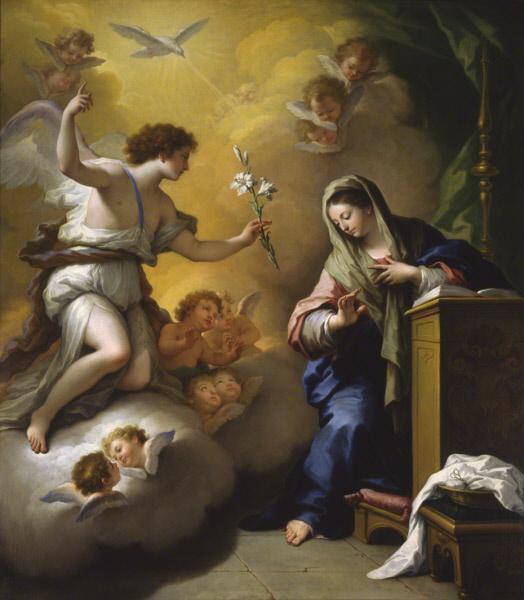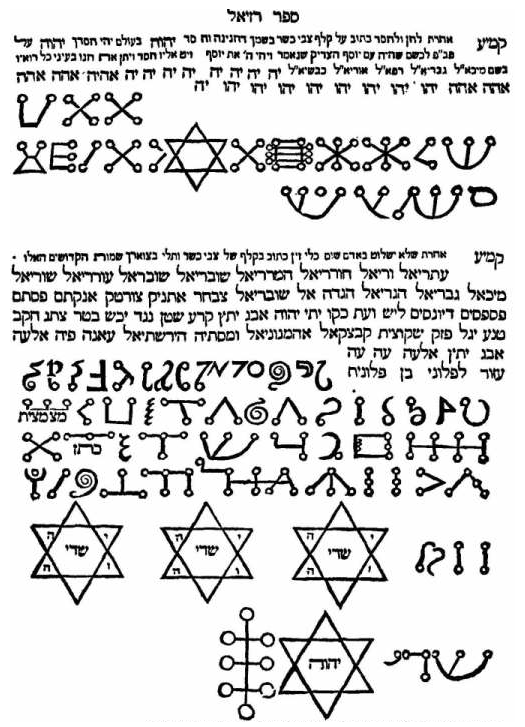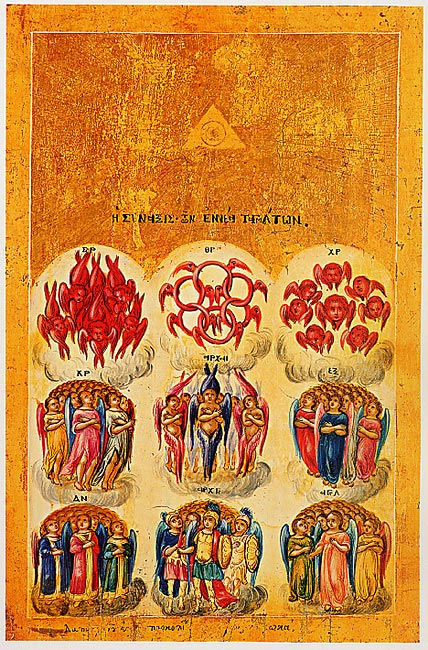|
Uziel (angel)
Uziel (or Usiel) is an archangel mentioned in some variants of 3 Enoch (but Ouza in others), in a variant of Sefer Raziel HaMalakh, in Johannes Trithemius's ''Steganographia'', and in John Milton's ''Paradise Lost''. See also * List of angels in theology This is a list of angels in theology, including both specific angels (e.g., Gabriel) and types of angels (e.g., seraphim). See also * Angel * Angels in art * Fallen angel * Guardian angel * Gustav Davidson * Heaven * Hierarchy of angels * List ... Citations * * * ''3Enoch''* Footnotes Angels in Christianity Angels in Judaism Individual angels {{christianity-stub ... [...More Info...] [...Related Items...] OR: [Wikipedia] [Google] [Baidu] |
Archangel
Archangels () are the second lowest rank of angel in the hierarchy of angels. The word ''archangel'' itself is usually associated with the Abrahamic religions, but beings that are very similar to archangels are found in a number of other religious traditions. Archangels also appear in the religious texts of Gnosticism. The English word ''archangel'' is derived from Greek ἀρχάγγελος (arkhángelos), the Greek prefix " arch-" meaning "chief". A common misconception is that archangels are the highest rank of angel, this misconception stems from John Milton's '' Paradise Lost'' and likely confusion over the "arch-" prefix. Description Michael and Gabriel are recognized as archangels in Judaism, Islam, and by most Christians. Some Protestants consider Michael to be the only archangel. Raphael—mentioned in the deuterocanonical Book of Tobit—is also recognized as a chief angel in the Catholic and Eastern Orthodox churches. Gabriel, Michael, and Raphael are venerated ... [...More Info...] [...Related Items...] OR: [Wikipedia] [Google] [Baidu] |
3 Enoch
The Third Book of Enoch ( he, ספר חנוך לר׳ ישמעאל כ׳׳ג , abbreviated as 3 Enoch) is a Biblical apocryphal book in Hebrew. 3 Enoch purports to have been written in the 2nd century, but its origins can only be traced to the 5th century. Other names for 3 Enoch include The Book of the Palaces, The Book of Rabbi Ishmael the High Priest and The Revelation of Metatron. Most commonly, the Book of Enoch refers to 1 Enoch, which survived completely only in Ge'ez. There is also a Second Book of Enoch, which has survived only in Old Slavonic, although Coptic fragments were also identified in 2009. None of the three books are considered canonical scripture by the majority of Jewish or Christian bodies. Content Modern scholars describe this book as pseudepigraphal, as it says it is written by "Rabbi Ishmael" who became a "high priest" after visions of ascension to Heaven. This has been taken as referring to Rabbi Ishmael, a 3rd generation Tanna and a leading figure of M ... [...More Info...] [...Related Items...] OR: [Wikipedia] [Google] [Baidu] |
Ouza
Samyaza ( he, שמחזי; arc, שמיחזה; el, Σεμιαζά; ar, ساميارس, '), also Shemhazai, Azza, Uzza, or Ouza, is a fallen angel of apocryphal Abrahamic traditions and Manichaeism who ranked in the heavenly hierarchy as the leader of the Watchers. Etymology The name "Shemyaza(z)" means "the (or my) name has seen," "he sees the name," or "I have seen." It is also spelled "Samyaza", "Shemhazai", "Samiaza(z)", "Semiaza", "Shamazya", "Shemyazaz", "Shemihazah", "Shemyaza", "Sêmîazâz", "Semjâzâ", "Samjâzâ", and "Semyaza". The scholars lean towards the Semitic etymology of this appellation which contains the letters ''shin'' (ש) and ''mem'' (מ), thus suggesting the derivation from either “name” (Heb. שם, ''shem'') or “heavens” (Heb. שמים, ''shamaym''). Moshe Idel proposed that Samyaza is the one who “gazes at heavens” or “gazes from heavens”. This interpretation goes well with the motif of the heavenly Watchers, i.e., the angels supervis ... [...More Info...] [...Related Items...] OR: [Wikipedia] [Google] [Baidu] |
Sefer Raziel HaMalakh
''Sefer Raziel HaMalakh'', (Hebrew:, "the book of Raziel the angel''"''), is a grimoire of Practical Kabbalah from the Middle Ages written primarily in Hebrew and Aramaic. ''Liber Razielis Archangeli'', its 13th-century Latin translation produced under Alfonso X of Castile, survives. Textual history The book cannot be shown to predate the 13th century, but may in parts date back to late antiquity. Like other obscure ancient texts such as the ''Bahir'' and ''Sefer Yetzirah'', the work has been extant in a number of versions. The tradition around the book attributes it to have been revealed to Adam by the angel Raziel. The title itself is mentioned in another magical work of late antiquity, ''The Sword of Moses''. Critical historians regard it as a medieval work, most probably originating among the Ashkenazi Hasidim, as citations from it begin to appear only in the 13th century. Sections of it are no doubt older. The likely compiler of the medieval version is Eleazar of Worms, as ... [...More Info...] [...Related Items...] OR: [Wikipedia] [Google] [Baidu] |
Johannes Trithemius
Johannes Trithemius (; 1 February 1462 – 13 December 1516), born Johann Heidenberg, was a German Benedictine abbot and a polymath who was active in the German Renaissance as a lexicographer, chronicler, cryptographer, and occultist. He is considered the founder of modern cryptography (a claim shared with Leon Battista Alberti) and steganography, as well as the founder of bibliography and literary studies as branches of knowledge. He had considerable influence on the development of early modern and modern occultism. His students included Heinrich Cornelius Agrippa and Paracelsus. Early life The byname ''Trithemius'' refers to his native town of Trittenheim on the Moselle River, at the time part of the Electorate of Trier. When Johannes was still an infant his father, Johann von Heidenburg, died. His stepfather, whom his mother Elisabeth married seven years later, was hostile to education and thus Johannes could only learn in secret and with many difficulties. He learned Greek, ... [...More Info...] [...Related Items...] OR: [Wikipedia] [Google] [Baidu] |
John Milton
John Milton (9 December 1608 – 8 November 1674) was an English poet and intellectual. His 1667 epic poem '' Paradise Lost'', written in blank verse and including over ten chapters, was written in a time of immense religious flux and political upheaval. It addressed the fall of man, including the temptation of Adam and Eve by the fallen angel Satan and God's expulsion of them from the Garden of Eden. ''Paradise Lost'' is widely considered one of the greatest works of literature ever written, and it elevated Milton's widely-held reputation as one of history's greatest poets. He also served as a civil servant for the Commonwealth of England under its Council of State and later under Oliver Cromwell. Writing in English, Latin, and Italian, Milton achieved global fame and recognition during his lifetime; his celebrated ''Areopagitica'' (1644), written in condemnation of pre-publication censorship, is among history's most influential and impassioned defences of freedom of spe ... [...More Info...] [...Related Items...] OR: [Wikipedia] [Google] [Baidu] |
Paradise Lost
''Paradise Lost'' is an epic poem in blank verse by the 17th-century English poet John Milton (1608–1674). The first version, published in 1667, consists of ten books with over ten thousand lines of verse (poetry), verse. A second edition followed in 1674, arranged into twelve books (in the manner of Virgil's ''Aeneid'') with minor revisions throughout. It is considered to be Milton's masterpiece, and it helped solidify his reputation as one of the greatest English poets of all time. The poem concerns the The Bible, biblical story of the Fall of Man: the temptation of Adam and Eve by the fallen angel Satan and their expulsion from the Garden of Eden. Composition In his introduction to the Penguin Books, Penguin edition of ''Paradise Lost'', the Milton scholar John Leonard notes, "John Milton was nearly sixty when he published ''Paradise Lost'' in 1667. The biographer John Aubrey (1626–1697) tells us that the poem was begun in about 1658 and finished in about 1663. However, ... [...More Info...] [...Related Items...] OR: [Wikipedia] [Google] [Baidu] |
List Of Angels In Theology ...
This is a list of angels in theology, including both specific angels (e.g., Gabriel) and types of angels (e.g., seraphim). See also * Angel * Angels in art * Fallen angel * Guardian angel * Gustav Davidson * Heaven * Hierarchy of angels * List of angels in fiction * List of theological demons * Seven Archangels References {{Angels in Abrahamic religions Angels In various theistic religious traditions an angel is a supernatural spiritual being who serves God. Abrahamic religions often depict angels as benevolent celestial intermediaries between God (or Heaven) and humanity. Other roles include ... [...More Info...] [...Related Items...] OR: [Wikipedia] [Google] [Baidu] |
Angels In Christianity
In Christianity, angels are the agents of God. Various works of Christian theology have devised hierarchies of angelic beings. The most influential Christian angelic hierarchy was put forward around the turn of the 6th century AD by Pseudo-Dionysius the Areopagite in his work ''De Coelesti Hierarchia'' (''On the Celestial Hierarchy''). He claimed to be an important figure who was converted by Paul the Apostle, who authored most of the New Testament, and his work enjoyed greater influence than it would have if he had used his actual name, until Erasmus publicised doubts about the age of the work in the early 16th century. Angels are organized into several orders, or "Angelic Choirs". As referred to in the theological doctrine of the communion of saints, in paradise there is a common and unique vision of the truth and christian contemplation, contemplation of the divine countenance, face of God, without any kind of difference between angels or human souls. The ''Summa theologia ... [...More Info...] [...Related Items...] OR: [Wikipedia] [Google] [Baidu] |
Angels In Judaism
In Judaism, angels ( he, ''mal’āḵ'', plural: ''mal’āḵīm'', literally "messenger") are supernatural beings that appear throughout the Tanakh (Hebrew Bible), rabbinic literature, Jewish apocrypha, apocrypha and List of Old Testament pseudepigrapha, pseudepigrapha, and traditional Jewish liturgy as agents of the Yahweh, God of Israel. They are categorized in different Jewish angelic hierarchy, hierarchies. Their essence is often associated with fire. The Talmud describes their very essence as fire. Etymology Hebrew ''mal’akh'' () is the standard word for "messenger", both human and divine, in the Tanakh (Hebrew Bible), though it is rarely used for human messengers in Modern Hebrew as the latter is usually denoted by the term ''shaliyakh'' (). The noun derives from the verbal Triliteral, consonantal root ''l-’-k'' (), meaning specifically "to send with a message" and with time was substituted with more applicable ''sh-l-h''. In Biblical Hebrew this root is attested ... [...More Info...] [...Related Items...] OR: [Wikipedia] [Google] [Baidu] |





